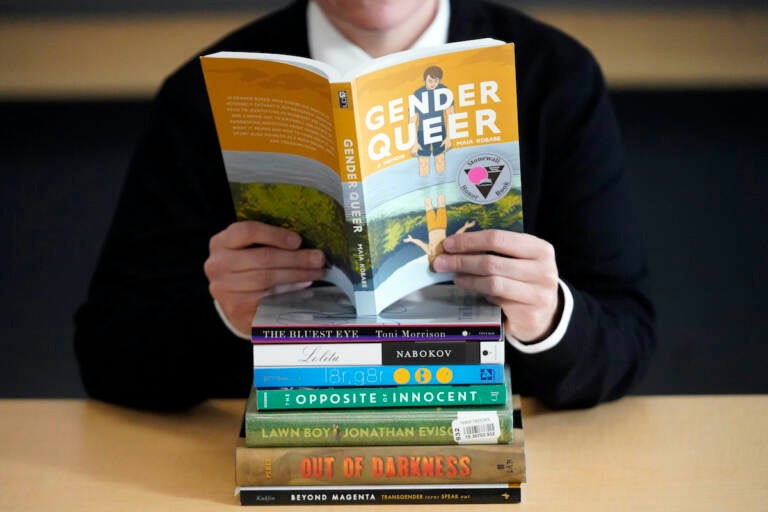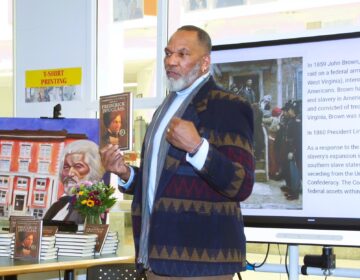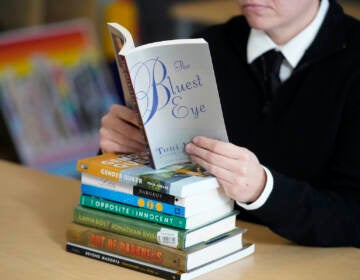Book ban attempts hit record high in 2022, library org says
A new report from the American Library Association says attempted book bannings and restrictions at school and public libraries continue to surge, setting a record in 2022.

A pile of challenged books appear at the Utah Pride Center in Salt Lake City on Dec. 16, 2021. Attempted book bannings and restrictions at school and public libraries continue to surge, according to a new report from the American Library Association. (AP Photo/Rick Bowmer, File)
Attempted book bans and restrictions at school and public libraries continue to surge, setting a record in 2022, according to a new report from the American Library Association released Thursday.
More than 1,200 challenges were compiled by the association in 2022, nearly double the then-record total from 2021 and by far the most since the ALA began keeping data 20 years ago.
“I’ve never seen anything like this,” says Deborah Caldwell-Stone, who directs the ALA’s Office for Intellectual Freedom. “The last two years have been exhausting, frightening, outrage inducing.”
Thursday’s report not only documents the growing number of challenges, but also their changing nature. A few years ago, complaints usually arose with parents and other community members and referred to an individual book. Now, the requests are often for multiple removals, and organized by national groups such as the conservative Moms for Liberty, which has a mission of “unifying, educating and empowering parents to defend their parental rights at all levels of government.”
Last year, more than 2,500 different books were objected to, compared to 1,858 in 2021 and just 566 in 2019. In numerous cases, hundreds of books were challenged in a single complaint. The ALA bases its findings on media accounts and voluntary reporting from libraries and acknowledges that the numbers might be far higher.
Librarians around the country have told of being harassed and threatened with violence or legal action.
“Every day professional librarians sit down with parents to thoughtfully determine what reading material is best suited for their child’s needs,” ALA President Lessa Kanani’opua Pelayo-Lozada said in a statement. “Now, many library workers face threats to their employment, their personal safety, and in some cases, threats of prosecution for providing books to youth they and their parents want to read.”
Caldwell-Stone says that some books have been targeted by liberals because of racist language — notably Mark Twain’s “The Adventures of Huckleberry Finn” — but the vast majority of complaints come from conservatives, directed at works with LGBTIQA+ or racial themes. They include Maia Kobabe’s “Gender Queer,” Jonathan Evison’s “Lawn Boy,” Angie Thomas’ “The Hate U Give” and a book-length edition of the “1619 Project,” the Pulitzer Prize-winning report from The New York Times on the legacy of slavery in the U.S.
Bills facilitating the restriction of books have been proposed or passed in Arizona, Iowa, Texas, Missouri and Oklahoma, among other states. In Florida, where Gov. Ron DeSantis has approved laws to review reading materials and limit classroom discussion of gender identity and race books pulled indefinitely or temporarily include John Green’s “Looking for Alaska,” Colleen Hoover’s “Hopeless,” Margaret Atwood’s dystopian novel “The Handmaid’s Tale” and Grace Lin’s picture story “Dim Sum for Everyone!”
More recently, Florida’s Martin County school district removed dozens of books from its middle schools and high schools, including numerous works by novelist Jodi Picoult, Toni Morrison’s Pulitzer Prize-winning “Beloved” and James Patterson’s “Maximum Ride” thrillers, a decision which the bestselling author has criticized on Twitter as “arbitrary and borderline absurd.”
DeSantis has called reports of mass bannings a “hoax,” saying in a statement released earlier this month that the allegations reveal “some are attempting to use our schools for indoctrination.”
Some books do come back. Officials at Florida’s Duval County Public Schools were widely criticized after they removed “Roberto Clemente: The Pride of the Pittsburgh Pirates,” a children’s biography of the late Puerto Rican baseball star. In February, they announced the book would again be on shelves, explaining that they needed to review it and make sure it didn’t violate any state laws.
WHYY is your source for fact-based, in-depth journalism and information. As a nonprofit organization, we rely on financial support from readers like you. Please give today.





